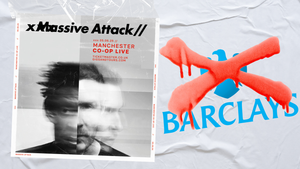Ahead of a show at Manchester’s Co-op Live last night, Massive Attack lashed out at the arena’s owners for entering into a sponsorship deal with Barclays.
The bank’s involvement in music has caused controversy in recent years as a result of its investments in fossil fuels and arms companies that supply Israel. In a statement on social media, the band said that they were proceeding with their show, but only after the arena agreed to remove Barclays branding from the venue during their concert.
Barclays announced new sponsorship deals with both Co-op Live and London’s The O2 last month. In a post on social media yesterday, Massive Attack wrote, “We confirmed this show at Co-Op Live arena back in January, not least because of the venue's strong sustainability credentials and ethical sponsorship”.
Then, fifteen days ago, and “without any advance warning or notification”, arena owner Oak View Group “announced a new corporate sponsorship with Barclays”.
Barclays has “no place in any of our cultural or sporting arenas”, the band added, it being “a commercial identity synonymous with the large-scale financing of new fossil fuel extraction, and billions of dollars of investments in arms companies that supply Israel in its genocidal onslaught of Gaza, and war crimes in the West Bank”.
Barclays previously had involvement in various Live Nation music festivals which caused quite a lot of controversy last year, resulting in the brand partnership with the live giant being cut short. It’s not clear if the bank - or Oak View Group, or The O2's operator AEG - hoped that associating the Barclays brand with a venue would be less problematic.
At least with a venue, you can deal with each angry artist individually, rather than momentum building over time and ultimately prompting multiple artists to bail from the line-up.
Back in 2018, Neil Young objected to the involvement of Barclays - specifically Barclaycard - in his show as part of AEG’s British Summer Time series in Hyde Park. However, because that festival is basically a series of standalone shows, a bespoke approach could be adopted, mirroring what Co-op Live did for Massive Attack, removing the bank’s branding for the one show.
That said, if too many artists start demanding that sponsor branding be removed or covered up when they play any one venue, that is going to create some major headaches for venue operators, while negatively impacting on the value of the brand’s sponsorship deal. By agreeing to Massive Attack’s demands, Co-op Live has possibly set a precedent that other artists may now look to exploit.
Expanding on what Co-op Live had agreed to in order to ensure the Massive Attack show could proceed, the band said, “Co-Op Live ownership have agreed to our insistence that all physical and digital Barclays livery and logos be completely removed from both the arena itself and our show page on the arena website, and that no show tickets - for sale or complimentary - will be given to Barclays”.
That said, the fact the Barclays sponsorship of Co-op Live was announced after the band’s show was booked is an important factor. Venue owners would presumably be much less amendable to bands who knew, or should have known, about the sponsorship when booking a show.
But it will be interesting to see if Barclays’ involvement in Co-op Live and The O2 results in some artists choosing to play alternative arenas in Manchester and London.
For the brands, paying good money for a partnership that results in artists publicly condemning you isn’t necessarily the most ideal use of marketing budgets.
That said, with more corporate brands like Barclays, it may be that - while the public condemnation is mainly restricted to the music media and a very specific corner of social media - the sponsors can tolerate being slagged off by angry artists.
Or maybe they’ll ultimately look to spend their money in places where their involvement is generally less controversial, in particular sport.

